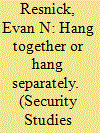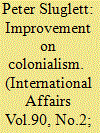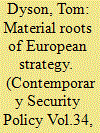| Srl | Item |
| 1 |
ID:
124789


|
|
|
|
|
| Publication |
2013.
|
| Summary/Abstract |
Neorealist and liberal theories advance discrepant explanations for variations in wartime alliance cohesion. Neorealism claims that variations in cohesion are attributable to shifting international systemic conditions; liberalism argues that such differences are a function of the regime type(s) of the various alliance partners. I advance a synthetic neoclassical realist theory that proposes a given ally's decision to minimize or maximize cohesion is a function of both international systemic conditions and the regime type of the state in question. I test the three theories in US, British, and Soviet alliance decision making during World War II and find that neoclassical realism alone accounts for the behavior of all three partners over the lifespan of the "Grand Alliance" (January 1942-September 1945). The article concludes by discussing the implications of these findings for the study and practice of alliance politics, as well as for contemporary US foreign policy
|
|
|
|
|
|
|
|
|
|
|
|
|
|
|
|
| 2 |
ID:
131433


|
|
|
|
|
| Publication |
2014.
|
| Summary/Abstract |
The mandate system was created as part of the overall machinery of the League of Nations in an attempt to 'promote world peace' in the aftermath of the First World War. The 'A' mandates, with which this article is concerned, were the former Arab provinces of the Ottoman Empire that had been occupied and conquered by France and Britain by the end of the war. Was the mandate system in any sense an improvement on colonialism? To the extent that the period of foreign rule was rather short in comparison with other colonial regimes, one can perhaps say that it was. On the other hand, however high-minded its stated aims, the mandate system was a product of the imperial framework of its day, in which the white races were regarded as superior to the brown or black races. The supervisory instruments of the League (specifically the Permanent Mandates' Commission) were inadequate to deal with any shortcomings on the part of the mandatory, and there are a number of examples of situations where, for example, the legitimate interests of minorities were ignored to suit the wider interests of the powers. In general, the mandated states lacked institutional underpinning, and their immediate legacy was a string of weak states throughout the Arab world, where many of the institutions of civil society were destroyed in the course of military coups in the 1950s and 1960s.
|
|
|
|
|
|
|
|
|
|
|
|
|
|
|
|
| 3 |
ID:
124992


|
|
|
|
|
| Publication |
2013.
|
| Summary/Abstract |
This article undertakes a critical examination of the analytical leverage provided by the literature on strategic culture in explaining the development of the European Union's Common Security and Defence Policy (CSDP). It posits that patterns of progress and stasis in CSDP cannot be fully explained by processes of normative convergence and the resilience of national strategic cultures. Instead, the article argues that a focus on material power sheds greater light on the dynamics driving and hindering Europe's quest for military autonomy. It highlights how the 'balance of threat' is fostering both convergence and differentiation in the defence policies of Britain, France, and Germany. Through case studies of the development of British, French, and German policy towards CSDP and NATO, the article demonstrates the important roles played by energy dependency and geographical position in determining the willingness of European states to embed their defence policies in NATO/CSDP or pursue national strategic autonomy. The article argues that strategic culture can provide valuable insights into European defence cooperation; however, this contribution is best framed within the theoretical insights of neoclassical realism. By highlighting the nature of the variables determining the scope and depth of European defence cooperation, the article raises a number of policy implications for European security.
|
|
|
|
|
|
|
|
|
|
|
|
|
|
|
|